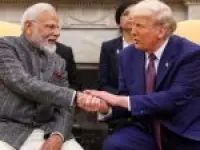
Human rights organization Amnesty International”s recent reports shed light on a troubling trend in India, where between April and June 2022, authorities in four BJP-ruled states and one Aam Aadmi Party-governed state demolished 128 structures, mostly belonging to Muslims. These demolitions, often celebrated by BJP leaders as measures against encroachment, have become a contentious issue. Besides being rendered homeless, several Muslims were also assaulted by the police for questioning the demolitions, Amnesty said on Wednesday. Authorities have denied that the Muslim community was being targeted.
The reports, titled “If you speak up, your house will be demolished’: Bulldozer Injustice in India” and “Unearthing Accountability: JCB’s Role and Responsibility in Bulldozer Injustice in India,” reveal Madhya Pradesh as having the highest number of demolitions at 56, followed by Gujarat with 36, and Delhi with 25. Assam and Uttar Pradesh reported eight and three demolitions, respectively.
Amnesty International found these demolitions to be targeted and forced evictions aimed at punishing Muslims who spoke out against injustices and discrimination they faced. Such actions violate international human rights laws and the International Covenant on Economic, Social and Cultural Rights, to which India is a signatory.
“The unlawful demolition of Muslim properties by the Indian authorities, peddled as ‘bulldozer justice’ by political leaders and media, is cruel and appalling,” said Agnès Callamard, Amnesty International’s Secretary General. “Such displacement and dispossession is deeply unjust, unlawful and discriminatory. They are destroying families and must stop immediately.”
Investigations into 63 of the demolitions revealed that protests by Muslims often preceded the demolitions, suggesting a pattern of retribution. BJP spokesperson Raman Malik told Al Jazeera in the wake of demolitions in August last year that bulldozing is only done to remove illegal encroachments.
However, civil society members and opposition politicians view these demolitions as deliberate acts of violence against minority communities.
For instance, in June 2022, Uttar Pradesh Chief Minister Adityanath reportedly threatened that bulldozers would continue to crush “criminals and mafia” after protests in Prayagraj against the disrespectful remarks made by BJP spokespersons on Prophet Muhammad turned violent.
On the same day, state authorities demolished the house of activist Javed Mohammed, who organised some of the protests. He was also arrested for carrying out violent protests in Prayagraj against two BJP spokespersons, who made those remarks.
The lack of due process safeguards, such as consultation, notice, or resettlement opportunities for affected parties, further exacerbates the injustice. Instances of police brutality against protesting Muslims have also been reported.
Amnesty International has also called on JCB construction equipment company, whose machinery is widely used in these demolitions, to publicly condemn the misuse of its equipment.
The report highlights the significant role JCB bulldozers play in demolitions across India, to the extent that “JCB” and “bulldozer” are used interchangeably. BJP leaders often praise the punitive use of JCB”s machinery. In April 2022, BJP spokesperson GVL Narasimha Rao even went as far as to derisively refer to JCB as the “Jihadi Control Board” in a now-deleted social media post.
“Under international standards, JCB is responsible for addressing what third-party buyers do with its equipment. The company must stop looking away as JCB machines are used to target and punish the Muslim community… JCB cannot continue to evade responsibility while its machines are repeatedly used to inflict human rights abuses,” said Amnesty’s Callamard.
In response, JCB has distanced itself from the situation, stating that it cannot control the use of its products once sold. However, this is not the first time JCB has faced accusations of complicity in human rights abuses, as similar concerns were raised regarding its machinery”s use in demolitions in Palestine.













